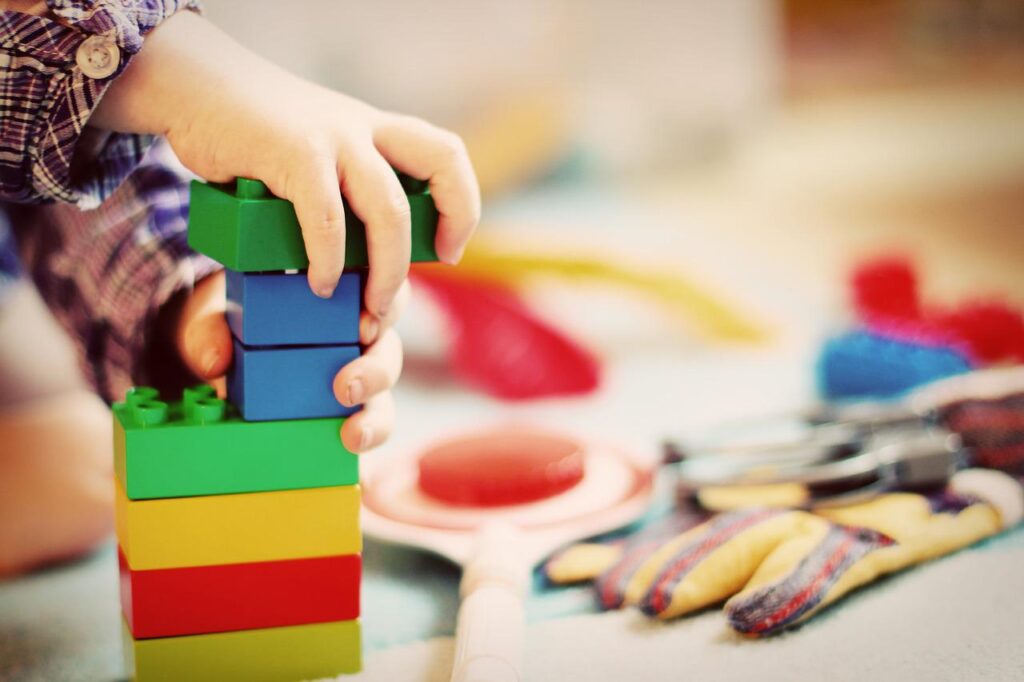
Play-Based Learning Session (Ages 2-5)
Unlike free play, where children explore completely independently, guided play involves purposeful interaction and subtle guidance to deepen learning. This could include asking questions, introducing new materials or gently steering the activity toward specific learning goals. The key is to ensure the child remains at the center of the experience, discovering and problem-solving in their own unique way.
What is Guided Play?
In my play-based learning sessions, I use guided play as the foundation for fostering curiosity, discovery and growth. Guided play is a research-backed approach to learning that combines the freedom of child-led exploration with the gentle support of an adult.
Unlike free play, where children explore completely independently, guided play involves purposeful interaction and subtle guidance to deepen learning. This could include asking questions, introducing new materials or gently steering the activity toward specific learning goals. The key is to ensure the child remains at the center of the experience, discovering and problem-solving in their own unique way.
Guided play aligns with the principles of the EYFS framework, which emphasise the importance of child-led activities in building confidence, creativity and critical thinking. Through guided play, children not only develop foundational academic skills like early literacy and numeracy, but they also grow emotionally, socially and physically in a fun and natural way.
Benefits for Your Child
Early experiences shape a child’s ability to learn, and guided play is one of the most effective ways to build strong neural connections that support future academic success. Research suggests that 90% of a child’s brain develops by age five (Harvard Center on the Developing Child), meaning these early years are crucial for laying the foundations for problem-solving, literacy, numeracy and communication.
Guided play allows children to physically engage with concepts, making them easier to understand and recall later. Through multi-sensory exploration, children naturally develop early math, language, and reasoning skills – whether they’re stacking blocks and discovering balance, pouring water to understand volume or recognizing patterns while building with LEGO. These hands-on experiences make abstract ideas feel familiar and intuitive when children encounter them in school.
Play also fosters intrinsic motivation, encouraging children to explore, experiment, and take risks in a safe, supportive environment. With a knowledgeable adult guiding their play, children receive just the right level of challenge to extend their thinking, build confidence, and develop resilience. Over time, these playful problem-solving experiences shape a strong growth mindset, helping children approach learning with curiosity rather than frustration.
Areas of Learning
✅ Stronger Foundations for Learning – From birth to age five, children’s brains are incredibly malleable, making this period critical for their cognitive development. Through hands-on play, they engage their senses and motor skills, building neural connections that shape how they think and learn later on. Whether they’re stacking blocks and discovering balance, pouring water to understand volume or recognising patterns while building with LEGO. These hands-on experiences lay the groundwork for future learning and make abstract ideas feel familiar and intuitive when children encounter them in school.
✅ Boosted Confidence & Curiosity – My sessions are designed to help children approach learning with excitement rather than pressure. By encouraging exploration and discovery, I help children build resilience, embrace challenges, and develop a love for learning that will stay with them for life.
✅ Early Language & Communication Development – Through storytelling, role-play, and engaging discussions, children expand their vocabulary, comprehension, and social skills. Guided play ensures they are not only exposed to new words but also understand and use them in meaningful contexts.
✅ Growth in Social & Emotional Skills – Play is also how children learn to regulate emotions, cooperate, and express themselves. I support them in navigating challenges, fostering independence, and building the confidence they need to thrive in new environments, including school.